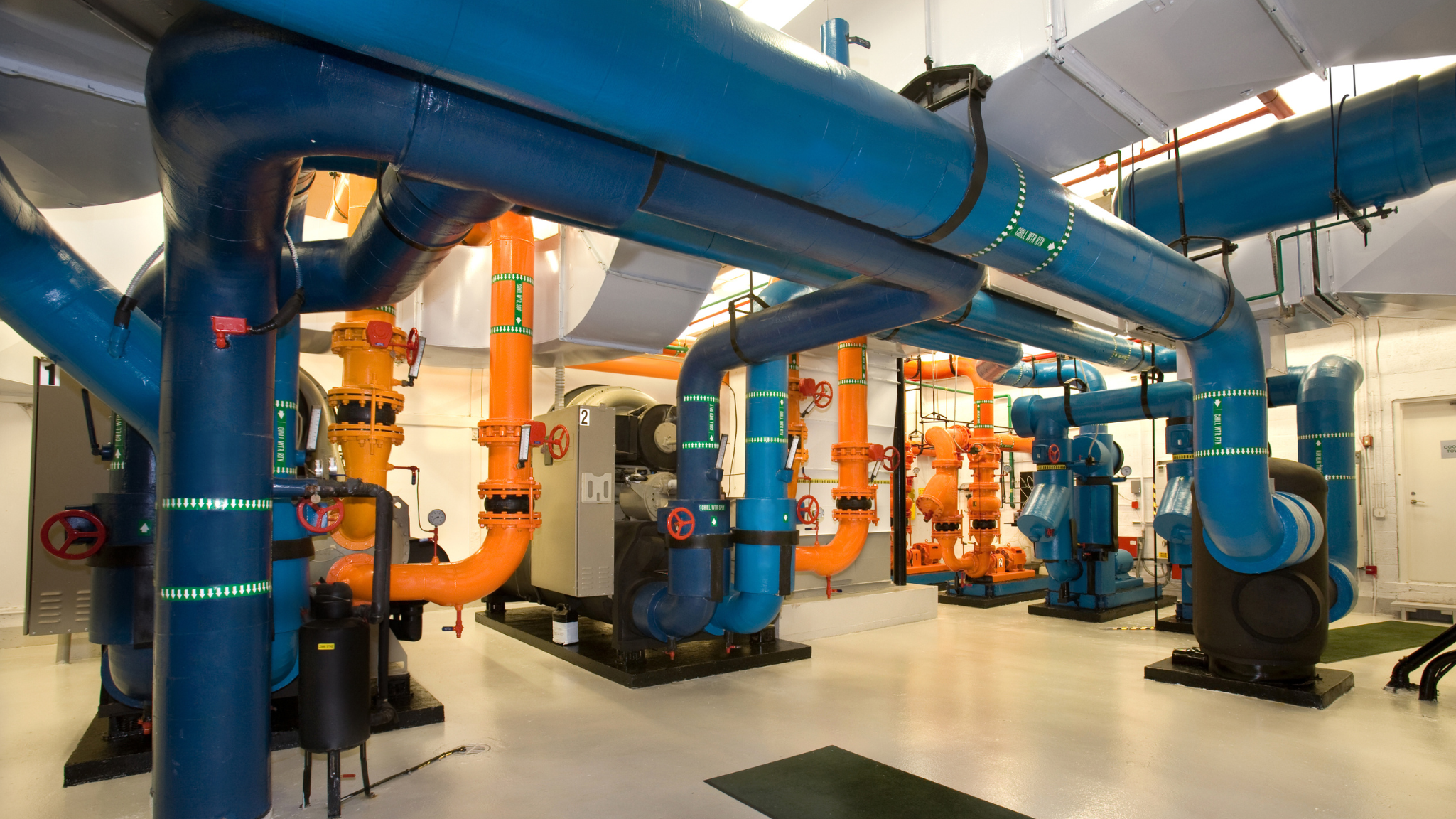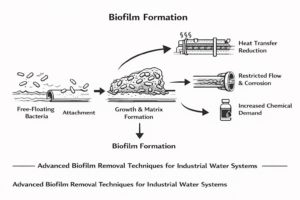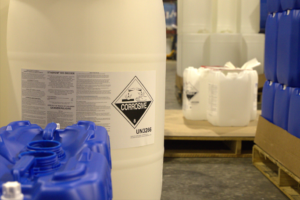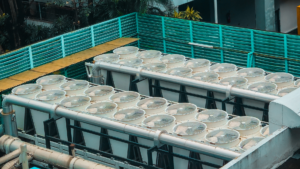In any industrial or commercial glycol system, scale buildup can be one of the most persistent threats to performance and equipment longevity. Scale forms when dissolved minerals in the water or glycol solution precipitate and deposit on heat transfer surfaces, restricting fluid flow, reducing heat exchange efficiency, and accelerating corrosion. Over time, even a thin layer of scale can drive up operating costs, shorten equipment life, and lead to unplanned downtime.
A scale inhibitor is a chemical treatment designed to prevent these mineral deposits from forming. The right inhibitor not only addresses the root causes of scale build up but also works in harmony with system materials, operating conditions, and water chemistry. Since every system—from a refrigeration system to a district cooling loop—faces unique challenges, choosing the right scale inhibitor is not a one-size-fits-all decision.
While ETI does not supply glycol fluids, our scale inhibitor and dispersant chemistries are engineered to perform in systems that may contain glycol blends, as well as traditional water-based loops. Differences in water quality, temperature ranges, and glycol type—whether propylene glycol, ethylene glycol, or food grade antifreeze—all influence how an inhibitor performs. This article explores how to match the right scale inhibitor to different water conditions, with a focus on protecting system performance and maximizing return on investment.
How Scale Forms in Different Water Conditions
Scale formation occurs when dissolved minerals in water or a glycol solution reach concentrations that exceed their solubility limits, causing them to precipitate and attach to internal surfaces such as pipes, heat exchangers, and valves. While this process may seem slow, even minimal deposition can significantly reduce heat transfer efficiency and restrict fluid flow over time.
Hard Water and Calcium-Based Scale
In regions with high mineral content, calcium and magnesium salts are the most common culprits. When temperature rises—especially in boilers, chillers, or closed-loop systems—these salts become less soluble, leading to scale build up. The deposits often appear as hard, crystalline layers that are difficult to remove without chemical cleaning.
Soft or Low-Mineral Water Challenges
Even in soft or low-mineral water, scaling can occur under the right conditions. High ph levels, chemical imbalances, or contamination from harmful particles in makeup water can cause alternative forms of deposition, including silica-based scale.
Impact of Temperature and Operation
Fluctuating operation temperatures, particularly in cooling or heating loops, influence scaling risk. Elevated temperature accelerates mineral precipitation, while rapid drop in temperature can change solubility balance and cause deposition. Seasonal operation changes, such as switching between cooling and heating modes, can intensify scaling issues.
Why It Matters
Uncontrolled scaling is more than just a maintenance issue—it reduces equipment efficiency, increases pumping costs, and can lead to early system failure. Understanding the relationship between water chemistry, deposition, and system conditions is the first step toward selecting an effective scale inhibitor.
Common Types of Scale Inhibitors
Choosing the right scale inhibitor starts with understanding the chemical categories available and how they function under different system conditions. While there are many formulations on the market, they generally fall into two types: threshold inhibitors and dispersants.
1. Threshold Inhibitors
Threshold inhibitors work by interfering with the early stages of crystal growth, keeping dissolved minerals such as calcium salts in solution at concentrations higher than their normal saturation point. This approach is important for systems where scale forms quickly under high temperature or variable ph. These inhibitors are particularly effective in applications where preventing scale before it forms is the priority.
2. Dispersants
Dispersants function differently, targeting scale particles after they form by keeping them suspended in the solution so they can be removed by filters or flushed out. Dispersants are often used in combination with threshold inhibitors to provide comprehensive protection in challenging application environments.
Compatibility and Performance
When selecting a product, compatibility with the glycol system is essential. Some inhibitors are optimized for mixture stability in propylene glycol or ethylene glycol solutions, while others are tailored for potable water systems. The right formulation ensures the product can operate within the system’s standard conditions, handle the intended variety of water qualities, and maintain effective protection without compromising heat transfer efficiency.
Specialized Inhibitors
Beyond general-purpose formulations, there are inhibitors designed for class-specific needs, such as low temperature operations, high-silica waters, or food-processing applications requiring non toxic or food grade antifreeze compatibility. These specialized products are chosen depending on the unique challenges posed by each system.
Read more on our blog: Chemical Descaling Explained: How to Choose the Right Scale Remover for Industrial Equipment and Advanced Dispersant Formulation for Industrial Water Treatments
Matching Scale Inhibitors to Water Conditions
Selecting the right scale inhibitor requires a clear understanding of the water chemistry, operating environment, and system materials. Different water conditions call for different chemical strategies to ensure reliable operation and prevent costly scale build up.
High-Hardness Water
In areas where source water has high calcium and magnesium content, inhibitors must have strong threshold inhibition and dispersant properties. These products slow crystal formation and keep minerals suspended, allowing removal through filters. They are especially important for cooling loops and chiller systems where temperature fluctuations increase deposition risk.
Low-Mineral Water
With low hardness, scaling may still occur due to silica or iron deposition. Here, the application often benefits from a targeted inhibitor that addresses specific mineral chemistry rather than a broad-spectrum formula.
Variable pH Levels
Systems operating outside neutral ph can accelerate corrosion and scaling. Inhibitors for these environments must be effective in stabilizing solution chemistry while preventing scale. This is critical in process applications with fluctuating chemical loads.
Potable Water Applications
When a scale inhibitor is needed for potable water, the formulation must meet safety and compatibility standards for human contact. Non toxic and food-safe inhibitors are often selected in this case, especially in industries handling beverages or pharmaceuticals.
Low Temperature and Freeze Protection
In low temperature systems, especially those using glycol solutions for freeze protection, the inhibitor must remain stable at the operating freezing point. This ensures both scaling control and uninterrupted operation in cold climates or refrigeration environments. Alternative formulations may be required for systems exposed to extremely cold conditions to maintain full performance.
Special Considerations for Glycol-Based Systems
A glycol system introduces unique challenges for scale inhibitor selection, as the chemistry must work effectively in environments where propylene glycol, ethylene glycol, or specialized food grade antifreeze is present. These fluids are often used in chilled water loops, refrigeration networks, and industrial process systems to provide freeze protection and maintain stable temperature control.
Glycol Types and Compatibility
- Propylene glycol is widely used where non toxic requirements are important, such as in food-processing facilities or systems connected to potable water supplies.
- Ethylene glycol offers strong thermal performance but must be handled carefully due to its higher toxicity, making it unsuitable for any application involving direct contact with consumable goods.
The selected scale inhibitor must be fully compatible with the glycol type, ensuring the mixture remains chemically stable across the entire operating range.
System Applications
Inhibitors for glycol-based systems are commonly found in glycol chillers, refrigeration systems, and chilled glycol loops. These applications often operate at lower than ambient temperatures, requiring formulations that can maintain performance and prevent mineral precipitation at the system’s freezing point.
Operational Considerations
- Fluid flow must remain consistent to avoid stagnant zones, which can encourage bacterial growth and localized corrosion.
- The ratio of glycol to water is critical. A higher concentration may lower the freezing point but can also increase viscosity, which influences inhibitor distribution and pumped circulation efficiency.
- Scale control in these environments supports overall equipment life, prevents deposition, and helps the system operate at optimal efficiency without excessive energy consumption.
Food Industry and Specialized Needs
When food safety is a factor, food grade antifreeze formulations are paired with inhibitors that meet NSF or similar certification standards. This ensures the product is safe for use in facilities where contact with food or beverages is possible, while still being effective at preventing scaling and corrosion. By aligning inhibitor chemistry with glycol type, application, and system conditions, facilities can achieve essentially trouble-free operation, extending system life and avoiding unplanned shutdowns.
How ETI Supports Scale Inhibitor Selection and Optimization
ETI has built its reputation on helping water treatment companies and industrial facilities control scale build up while maintaining system efficiency. With decades of expertise in chemical blending and formulation, ETI provides solutions that not only dissolve existing deposits but also prevent future deposition in critical equipment such as boilers, cooling towers, heat exchangers, and glycol systems.
High-Performance Scale Removal and Prevention
ETI’s water scale remover formulations are engineered to dissolve calcium, magnesium, and silica-based deposits quickly and effectively. By restoring fluid flow and heat transfer performance, these treatments help reduce energy consumption, prevent corrosion, and extend equipment life. Available in biodegradable and low-corrosion options, ETI products are safe for a variety of applications, including low temperature operations and potable water systems.
Custom-Blended Solutions for Unique Conditions
Not every system faces the same water chemistry challenges. ETI’s custom blending capabilities allow the development of scale inhibitor formulations tailored to specific conditions, whether that involves propylene glycol-based refrigeration loops, ethylene glycol closed circuits, or food grade antifreeze for sensitive applications. Each formulation is backed by ISO 9001-certified quality control, in-house laboratory testing, and system-specific engineering to ensure maximum compatibility and performance.
By partnering with ETI, you gain a technical resource capable of assessing your water conditions, designing the right product, and supporting ongoing treatment optimization to keep your systems operating at peak efficiency.
Learn more about ETI’s custom chemical blending services and scale remover solutions to protect your systems and prevent costly downtime.
Protecting System Performance with the Right Scale Inhibitor
Selecting the right scale inhibitor for a glycol system is not just about chemistry, it is about ensuring that the entire system operates at peak performance over its expected life. Whether the challenge is scale build up from calcium-rich water, mineral precipitation in low temperature loops, or maintaining compatibility in specialized applications like food grade antifreeze systems, a targeted approach is essential.
By matching inhibitor formulation to water quality, temperature range, and operational demands, facilities can preventing costly fouling, protect equipment, and reduce long-term operating expenses. The result is a more reliable operation, better heat transfer, and a system that can operate efficiently for years to come.
Partner with ETI for Expert Solutions
ETI delivers proven water scale removal technologies and custom-blended inhibitor programs that are tailored to your system’s exact needs. From diagnosing water conditions to creating high-performance formulations, our technical team ensures you get the most effective protection possible.
Visit our website to learn more about our solutions.
Frequently Asked Questions (FAQs)
How does reverse osmosis reduce total dissolved solids (TDS)?
An RO membrane is designed to reject salts and other dissolved materials, significantly lowering total dissolved solids. By forcing water molecules through the semi permeable layers, the system separates clean water from minerals, metals, and other contaminants.
What happens if my RO system runs under low pressure?
Low pressure reduces the driving force that pushes water through the membrane. This leads to slower flow rates, higher salt passage, and reduced overall efficiency. A properly sized pump is critical to maintaining reliable operation.
Can reverse osmosis remove lead, arsenic, salt, and fluoride?
Yes. RO membranes are highly effective at removing heavy metals such as lead and arsenic, as well as dissolved salt and fluoride. These contaminants are among the most important reasons households and industries rely on reverse osmosis filtration.
How often should RO filters or membranes be replaced?
Filters in an RO system, including the sediment filter and carbon stage, typically need to be replaced every 6–12 months. The membrane itself can last several years with proper use of anti scale treatments to prevent fouling.
Do RO systems remove microorganisms and improve odor in water?
Yes, RO membranes block most microorganisms, including bacteria, while carbon stages reduce odor caused by chlorine and organic matter. Together, these steps ensure better-tasting drinking water.
Can reverse osmosis treat water contaminated with oil or industrial chemicals?
While RO membranes can reduce many organic chemicals, they are not a complete solution for oil contamination. In such cases, pretreatment and specialized filtration system designs are recommended.
What advantages do whole house RO systems provide?
A whole house RO system treats all incoming supply water, ensuring that every tap delivers clean, softened water. This protects plumbing, appliances, and improves overall customer satisfaction for both drinking and utility uses.





